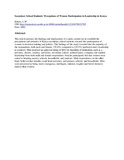| dc.description.abstract | This article presents the findings and implications of a study carried out to establish the perceptions and attitudes of Kenya secondary school students towards the participation of women in decision-making and politics. The findings of the study revealed that the majority of the respondents, both male and female, (70.8%) compared to (29.2%) preferred men's leadership to women's. Men received an approval rating of 86% for headship of institutions such as a province, district, country, university, secondary school, political party, company and student leadership from both male and female respondents. Female participants felt that women were suited to heading nursery schools, households, and students. Male respondents, on the other hand, believed that females could head nurseries, and primary schools, and households. Men were perceived as being more courageous, intelligent, rational, tougher and
better decision makers than women. | en |

